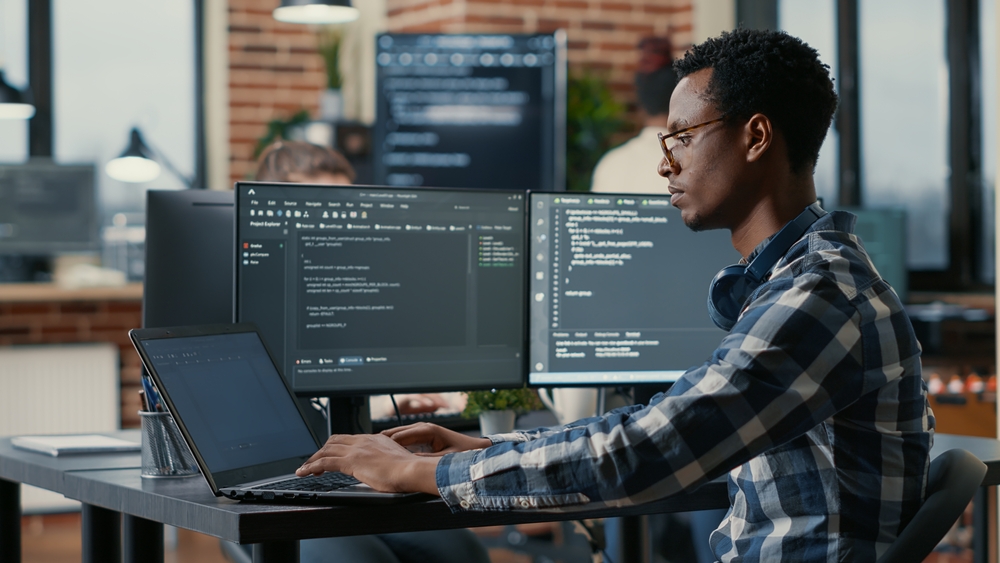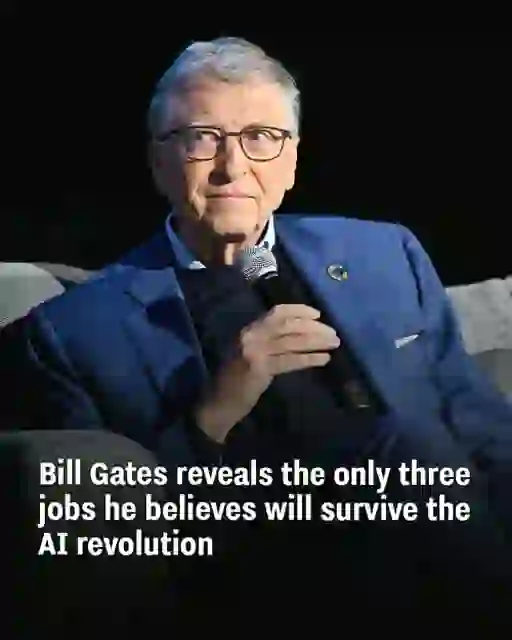The future is here, and it’s got a whole lot of robots in it. As technology keeps evolving, artificial intelligence is making waves in almost every industry. From driving cars to writing news articles, AI is stepping in to handle tasks that once required a human touch to do the job.
Bill Gates, a visionary on all things tech, has weighed in on this brave new world. He predicts that, by 2030, AI will replace a significant chunk of jobs—some sooner than others. While the rise of robots and machines may seem intimidating, Gates believes there are certain jobs that will stand the test of time.
So, which jobs should you be worried about, and which ones are safe from the robotic takeover? Let’s break it down! Here’s a closer look at the jobs at risk—and the three key roles that Gates says AI can’t replace. Spoiler alert: they’re not what you’d expect!
Taxi and Truck Drivers

Self-driving cars and trucks are becoming a reality. These autonomous vehicles will drive themselves, significantly reducing the need for human drivers. Although this transition won’t happen overnight, AI’s progress in transportation continues to accelerate. Fewer people will need to drive taxis and trucks in the future. As a result, driving jobs will get replaced by autonomous vehicles.
Retail Cashier Jobs

Self-checkout systems and automated kiosks are replacing traditional cashiers in many stores. AI-powered tools now scan items, process payments, and issue receipts with speed and precision. Machines are more cost-effective than human cashiers, making them the preferred choice for retailers. As customers become more familiar with automation, cashier jobs will continue to decline and retailers will rely increasingly on these technologies for smoother operations.
Bookkeeping Clerks

AI already performs many bookkeeping tasks with high precision. Machines track finances, reconcile accounts, and process invoices faster than humans. These systems can also generate financial reports and identify trends in the data. As automation improves, fewer people will perform manual bookkeeping tasks. Therefore, AI will replace human clerks for most of these routine tasks.
Receptionist Jobs

Virtual assistants are replacing human receptionists in many businesses and offices these days. AI is capable of answers=ing calls, scheduling appointments, and managing emails with increasing accuracy. Voice recognition technology has also improved, making these systems more effective at interacting with people. Consequently, businesses will adopt AI for administrative tasks. As a result, traditional receptionist roles will shrink.
Data Entry Clerks

AI excels at repetitive data entry tasks. Machines can process and enter data quickly and accurately with little human involvement. AI ia also able to analyzes large amounts of data efficiently, improving accuracy and speed. As a result, companies will rely more on AI to handle data entry and eventually human data entry clerks will see their jobs replaced by automation.
Customer Service Representatives

AI-driven chatbots are taking over many customer service roles. These systems are capable of responding to customer questions, resolving issues, and providing assistance without human input. As AI improves, businesses will increasingly turn to automation for customer service. This shift will eventually reduce the demand for human customer service representatives. AI’s ability to offer faster, more consistent service will make it the preferred solution for most businesses.
Fast Food Workers

Fast food chains use AI to improve service speed and efficiency. Machines take orders, cook meals, and serve customers without the need for human workers. Self-ordering kiosks and automated cooking tools make human employees unnecessary. These systems work continuously without breaks, boosting efficiency. As automation increases, the demand for fast food workers will continue to decrease.
Insurance Underwriters

AI revolutionizes the insurance industry by automating routine tasks. Machines assess risks, process claims, and make decisions faster than humans. AI analyzes vast amounts of data to predict outcomes and set policy terms. As a result, the demand for human underwriters will decline. Human input will remain necessary for complex cases, but most underwriting jobs will be automated.
Factory Workers

Robots replace many manual labor tasks in factories. AI-powered machines assemble products, package them, and perform quality control tasks more efficiently than humans. These machines work continuously without breaks and make fewer errors, and as automation technology improves, fewer human workers will be needed in factories. Factory work will increasingly shift to AI-powered machines with time.
Market Research Analysts

AI transforms market research by analyzing large data sets quickly. Machines identify trends and predict market movements faster than human analysts. As a result, demand for human analysts will decrease, particularly for data-heavy tasks. AI will take over most of the data interpretation and trend analysis in market research. Consequently, market research jobs will shrink.
Lawyers (Routine Tasks)

AI automates many routine legal tasks. For instance, AI reviews documents, analyzes contracts, and conducts legal research quickly. These tasks consume valuable time but are simple for AI to perform. By automating these functions, AI allows lawyers to focus on more complex matters. As a result, fewer entry-level legal jobs will exist, and AI will handle routine legal work.
Health Diagnosticians

AI plays a key role in healthcare, especially in diagnostics. Machine learning algorithms analyze medical images and identify issues more accurately and faster than humans. These systems process patient data, helping doctors make better decisions. Doctors will still be essential for patient care, but AI will take over diagnostic tasks. This will make healthcare more efficient and accurate.
Construction Workers

AI-powered machines handle several tasks in the construction industry. Drones, robots, and automated tools are capable to survey sites, lay bricks, and complete other jobs. These machines work in dangerous environments, improving safety and efficiency. As technology advances, fewer humans will be needed for manual labor on construction sites. As a result, AI will increasingly manage construction projects.
Journalist Jobs

AI already writes basic news articles and reports. By analyzing data, AI quickly produces content, especially for routine topics like sports or finance. These systems generate accurate, unbiased reports, speeding up the news cycle. While investigative journalism still requires human expertise, AI replaces many entry-level writing positions. Consequently, fewer humans will be needed to produce basic news content.
Teaching Jobs (To a Degree)

AI has the potential to change the education system. AI-powered tools personalize learning, adapting lessons to each student’s needs. These systems can assist with grading and other administrative tasks. However, teaching still requires human interaction, emotional intelligence, and mentorship. AI will support teachers, but it won’t replace them entirely.
The Human Touch- Things AI Can’t Replace

AI struggles to replicate the unique qualities that define human creativity, empathy, and connection. Jobs in art, writing, music, therapy, counseling, and social work rely on imagination, emotional intelligence, and personal interactions—traits that only humans can truly provide. Whether designing a product, composing a symphony, or offering support through therapy, these roles demand emotional expression, deep understanding, and the ability to form meaningful relationships.
Biologists – Unlocking the Secrets of Life

Biologists will continue to be indispensable in the age of AI. While AI can analyze large datasets and assist in diagnosing diseases, it cannot replace the deep understanding and hands-on expertise of biologists. Gates emphasizes the importance of human insight in interpreting scientific data, especially in complex areas like genetics and ecology. AI may help accelerate discoveries, but only humans can provide the creativity and critical thinking needed to push the boundaries of scientific research.
Coders – The Architects of the AI Future

While AI can generate code, human coders remain essential. AI can assist with writing and testing code, but it can’t replace the creativity and problem-solving skills that coders bring to the table. Coders are needed to design, refine, and correct algorithms, ensuring that the software works as intended. Gates believes that, despite AI advancements, skilled human coders will still be the driving force behind the development of new technologies. The human touch will always be necessary to troubleshoot and optimize AI systems.
Energy Experts – Powering the Green Future

Energy experts play a critical role in shaping the future of sustainable energy. AI may assist in optimizing energy systems, but human experts are needed to navigate the complexities of climate change, policy, and innovation. Gates highlights the importance of skilled energy professionals in achieving global climate goals, like net-zero emissions by 2050. While AI will aid in the process, energy experts will remain crucial in designing, implementing, and improving energy solutions to tackle the world’s biggest environmental challenges.
Looking Ahead to the Future

AI will reshape the job market in the coming years. While automation will replace some roles, other jobs will adapt and thrive with AI’s assistance. Creativity, emotional intelligence, and human connection will protect certain jobs from being automated. While workers should focus on developing skills that complement AI advancements. These human-centered professions will remain vital to the workforce, ensuring that humans continue to play a key role alongside AI.

